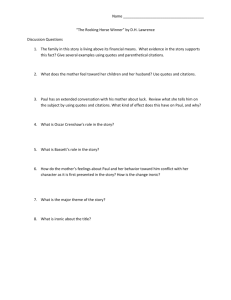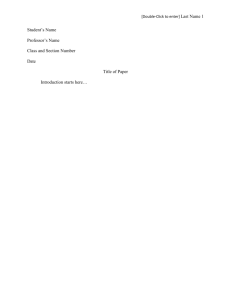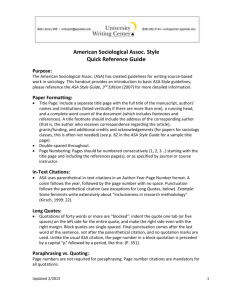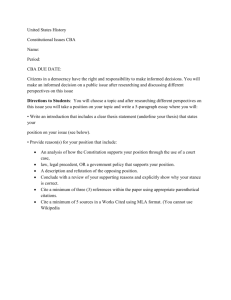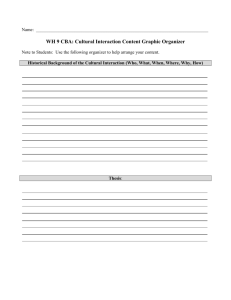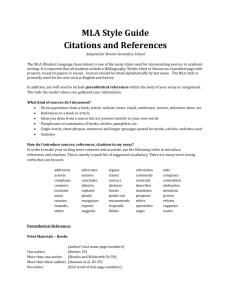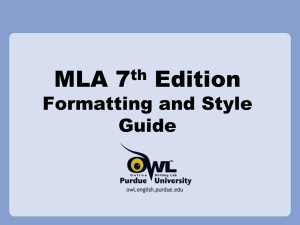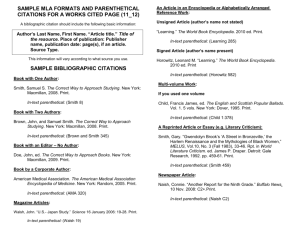HowtoWrite ParentheticalCitations MLA
advertisement
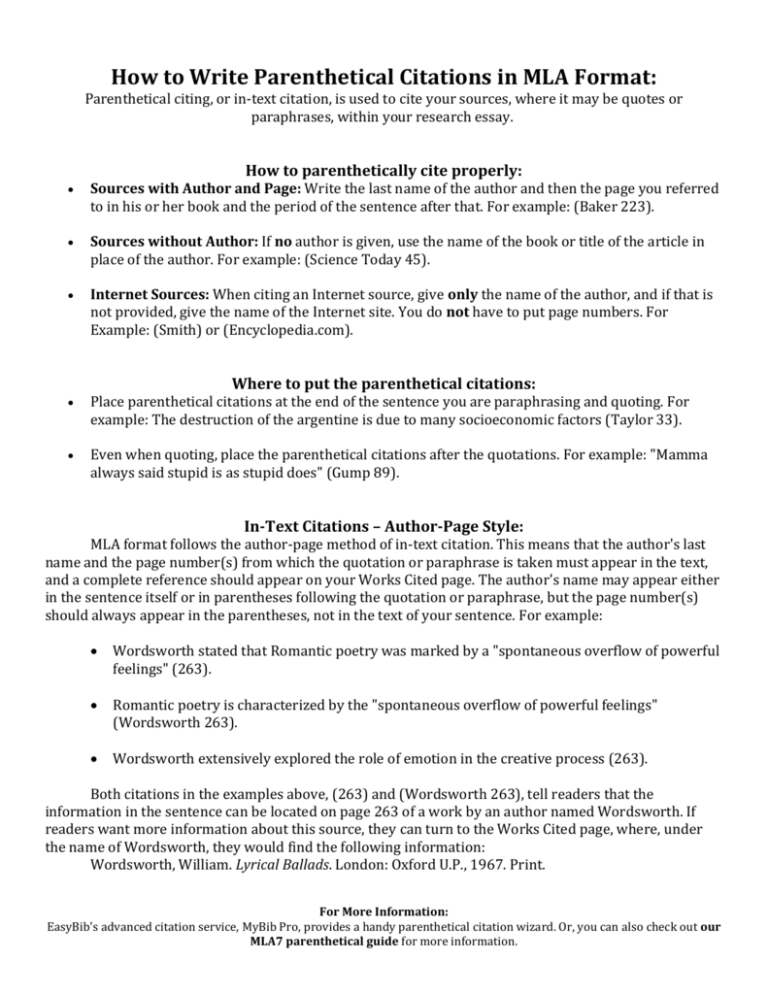
How to Write Parenthetical Citations in MLA Format: Parenthetical citing, or in-text citation, is used to cite your sources, where it may be quotes or paraphrases, within your research essay. How to parenthetically cite properly: Sources with Author and Page: Write the last name of the author and then the page you referred to in his or her book and the period of the sentence after that. For example: (Baker 223). Sources without Author: If no author is given, use the name of the book or title of the article in place of the author. For example: (Science Today 45). Internet Sources: When citing an Internet source, give only the name of the author, and if that is not provided, give the name of the Internet site. You do not have to put page numbers. For Example: (Smith) or (Encyclopedia.com). Where to put the parenthetical citations: Place parenthetical citations at the end of the sentence you are paraphrasing and quoting. For example: The destruction of the argentine is due to many socioeconomic factors (Taylor 33). Even when quoting, place the parenthetical citations after the quotations. For example: "Mamma always said stupid is as stupid does" (Gump 89). In-Text Citations – Author-Page Style: MLA format follows the author-page method of in-text citation. This means that the author's last name and the page number(s) from which the quotation or paraphrase is taken must appear in the text, and a complete reference should appear on your Works Cited page. The author's name may appear either in the sentence itself or in parentheses following the quotation or paraphrase, but the page number(s) should always appear in the parentheses, not in the text of your sentence. For example: Wordsworth stated that Romantic poetry was marked by a "spontaneous overflow of powerful feelings" (263). Romantic poetry is characterized by the "spontaneous overflow of powerful feelings" (Wordsworth 263). Wordsworth extensively explored the role of emotion in the creative process (263). Both citations in the examples above, (263) and (Wordsworth 263), tell readers that the information in the sentence can be located on page 263 of a work by an author named Wordsworth. If readers want more information about this source, they can turn to the Works Cited page, where, under the name of Wordsworth, they would find the following information: Wordsworth, William. Lyrical Ballads. London: Oxford U.P., 1967. Print. For More Information: EasyBib's advanced citation service, MyBib Pro, provides a handy parenthetical citation wizard. Or, you can also check out our MLA7 parenthetical guide for more information. How to Write Parenthetical Citations in MLA Format: Parenthetical citing, or in-text citation, is used to cite your sources, where it may be quotes or paraphrases, within your research essay. How to parenthetically cite properly: Sources with Author and Page: Write the last name of the author and then the page you referred to in his or her book and the period of the sentence after that. For example: (Baker 223). Sources without Author: If no author is given, use the name of the book or title of the article in place of the author. For example: (Science Today 45). Internet Sources: When citing an Internet source, give only the name of the author, and if that is not provided, give the name of the Internet site. You do not have to put page numbers. For Example: (Smith) or (Encyclopedia.com). Where to put the parenthetical citations: Place parenthetical citations at the end of the sentence you are paraphrasing and quoting. For example: The destruction of the argentine is due to many socioeconomic factors (Taylor 33). Even when quoting, place the parenthetical citations after the quotations. For example: "Mamma always said stupid is as stupid does" (Gump 89). In-Text Citations – Author-Page Style: MLA format follows the author-page method of in-text citation. This means that the author's last name and the page number(s) from which the quotation or paraphrase is taken must appear in the text, and a complete reference should appear on your Works Cited page. The author's name may appear either in the sentence itself or in parentheses following the quotation or paraphrase, but the page number(s) should always appear in the parentheses, not in the text of your sentence. For example: Mrs. Cee stated that “books turned into films are marked by an appalling alteration of important details" (14). Hollywood films are known for their “appalling alteration of important details" of novels (Cee 14). Mrs. Cee extensively explored the role of Hollywood in its ruining of great novels (14). Both citations in the examples above, (14) and (Cee 14), tell readers that the information in the sentence can be located on page 14 of a work by an author named Cee. If readers want more information about this source, they can turn to the Works Cited page, where, under the name of Cee, they would find the following information: Cee, Mrs. Complaints of Hollywood. London: Oxford U.P., 2014. Print. For More Information: EasyBib's advanced citation service, MyBib Pro, provides a handy parenthetical citation wizard. Or, you can also check out our MLA7 parenthetical guide for more information.
